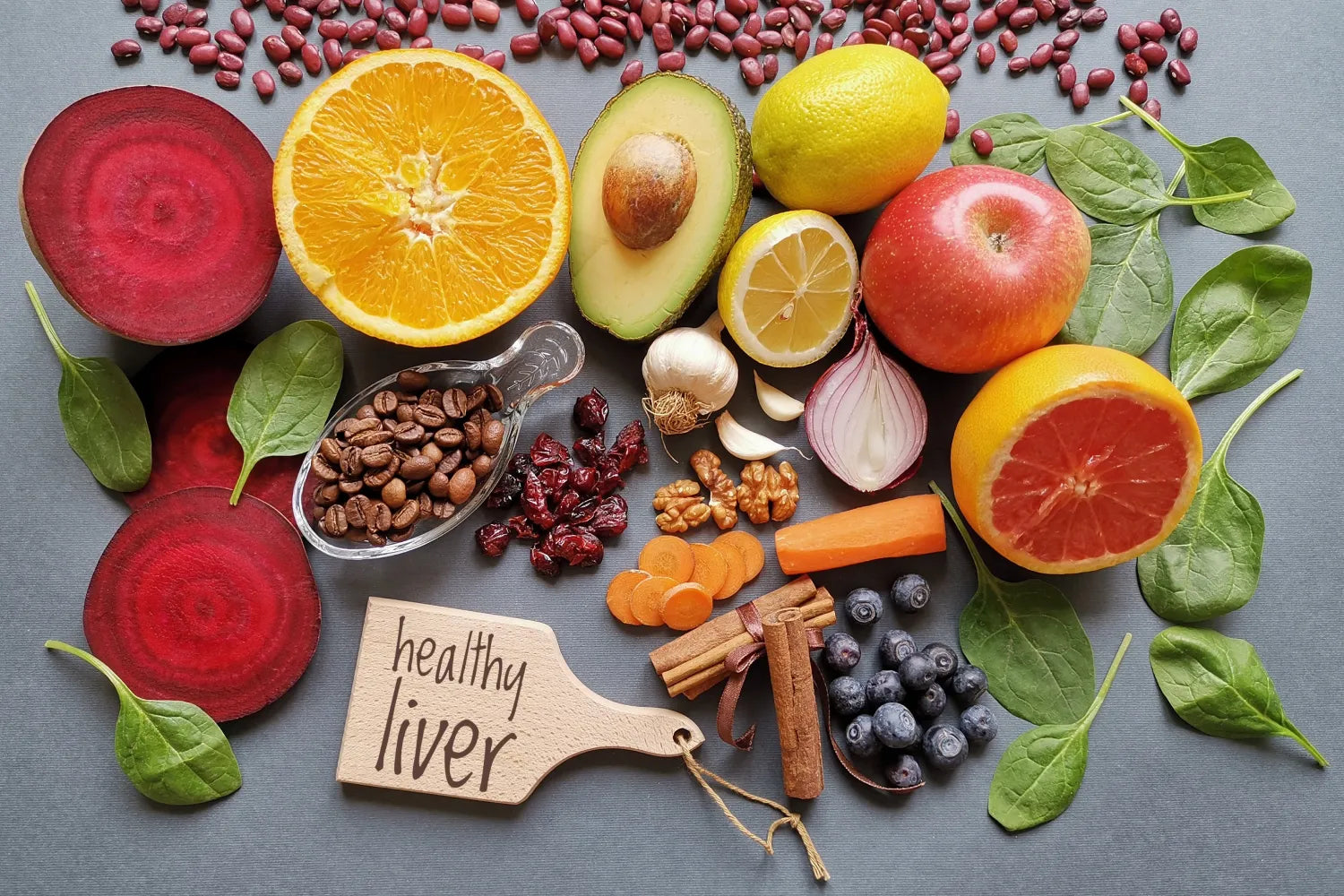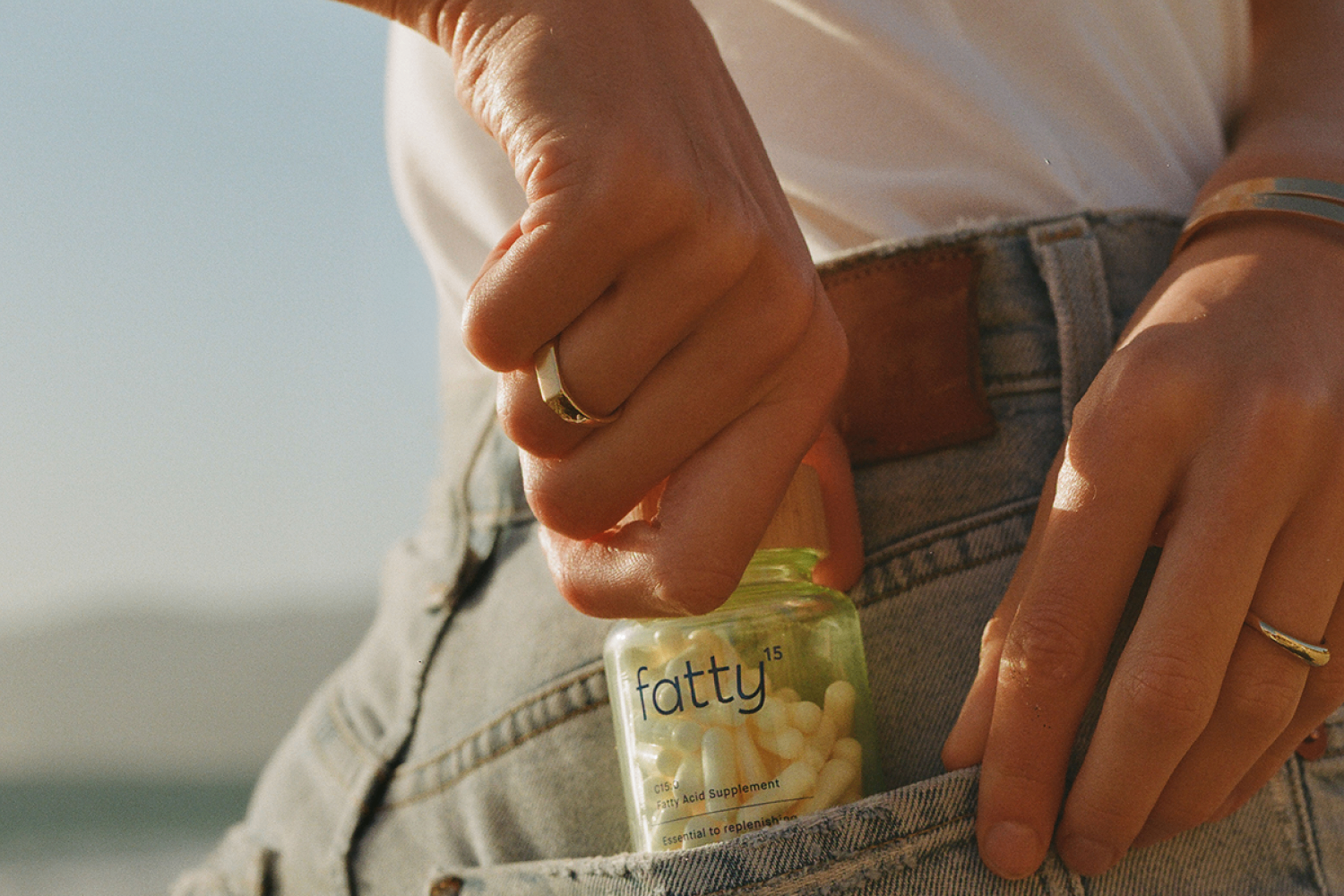
Dr. Eric Venn-Watson’s Highlights
-
Your liver has numerous functions that are vital to your existence.
Choosing foods that support your liver’s health can reduce your risk of developing certain liver diseases.
Taking a supplement like fatty15 can help support liver health and improve your overall wellness.
If you’ve gotten the news from your doctor that your liver health is declining, you’re probably looking for ways to improve it. The liver is a resilient organ, capable of regenerating itself and repairing damage, and your food choices play an important role in supporting your liver function.
Together, we’ll talk about some of the liver's most important functions, the risk factors for liver disease, and what foods actively protect and support healthy liver function.
Understanding Liver Function
The liver has over 500 identifiable functions and is essential for maintaining our overall health and wellness.
In addition to filtering toxins out of our bloodstream, the liver:
- Produces albumin, a transport protein that carries hormones, nutrients, and enzymes to other parts of the body.
- Regulates glucose levels.
- Removes bilirubin. Bilirubin is released when cells naturally reach apoptosis (cell death). It has a yellowish tint, which is why decreased liver function often produces a yellow tint in the eyes and skin. Bilirubin is broken down by the liver and removed through bile that is sent to the intestines.
- Produces bile. Bile is essential for the breakdown of fatty acids and the removal of waste from the body.
- Helps blood clot properly.
- Creates the proteins found in the plasma in our blood.
- Stores iron, vitamins, and minerals.
- Supports the body’s immune system.
- Regulates the production of amino acids needed to create more protein.
The liver has many jobs to do, and liver damage can interfere with its ability to function properly. You might think that liver health begins and ends with alcohol consumption, but that’s not the case. While limiting alcohol has protective effects on the liver, diet and lifestyle also play an important role.
Understanding Liver Disease
Liver damage can happen due to excessive alcohol consumption, but it can also happen as a result of certain illnesses (like hepatitis) and due to genetic factors. There are many different types of liver disease, including nonalcoholic fatty liver disease (NAFLD) and alcoholic fatty liver disease (AFLD).
Liver disease happens in stages.
Hepatitis
The earliest state of liver disease is hepatitis. This stage involves increased inflammation in the liver. The body’s response to inflammation is to try to repair and heal the damaged tissue with scar tissue. Gradually, more scar tissue forms if liver health does not improve.
Fibrosis
The second stage of liver disease is fibrosis, a condition in which more scar tissue forms and the liver becomes restricted in its ability to function properly. Blood flow and oxygen to the liver are also restricted, which further decreases liver function.
Cirrhosis
Liver cirrhosis is a critical stage of liver disease. When you have cirrhosis of the liver, you have permanently scarred liver tissue that is not reversible. Although you can arrest further scarring and prevent further liver damage, the damage done at this stage cannot be repaired, which may impact your liver’s function for the rest of your life.
Liver Failure
The final stage of liver disease is liver failure. At this point, your liver has scar tissue buildup, making it impossible to function properly. This is a life-threatening condition, and a liver transplant may be needed as liver function continues to break down.
Liver disease is alarmingly, on the rise in the US and globally. Currently one in every three people and one in every 10 children has NAFLD (nonalcoholic fatty liver disease) that can progress to liver cirrhosis and liver cancer. Taking care of your liver to prevent disease is essential to maintaining wellness and ensuring your both your healthspan and your lifespan.
Protecting Your Liver
In addition to limiting alcohol, your diet and lifestyle plays a role in liver health. NAFLD or Nonalcoholic fatty liver disease, for example, is caused by the buildup of excess fats stored in the liver in a person who does not or rarely drinks alcohol.
Consuming more calories than you need can lead to excess fat storage in the liver. People who suffer from obesity, high cholesterol, and diabetes are at higher risk of developing liver disease than people who maintain a healthy weight and get plenty of exercise.
That means that making the right food choices is important to liver health. We’ll break down the best foods for maintaining a healthy liver, including a supplement that contains a surprising ingredient.
Top 6 Foods for Liver Health
Supporting your liver requires balancing your diet and ensuring you’re not taking in too many calories. You can also opt for food choices linked with healthy liver function, like these.
1. Fruits and Vegetables
You’ve heard it time and again: to increase your health and wellness, add more fruits and veggies to your plate. The same advice is true for liver health, too. Fruits and vegetables contain antioxidants, which help protect the body against oxidative stress.
The production of reactive oxygen species, or ROS, negatively impacts hepatic proteins and DNA through the process of oxidative stress. Oxidative stress happens when the body is exposed to toxins like alcohol, chemicals, cigarette smoke, and pollution.
Antioxidants protect cells from oxidative stress, and fruits and vegetables are packed with them. Blueberries, grapefruit, and cranberries are all sources of antioxidants.
2. Lean Proteins
Protein is essential to healthy liver function, but your protein choices matter. Instead of processed meats or meat that contains a lot of animal fat, opt for leaner cuts like chicken, fish, and pork.
You can also opt for plant-based options like tofu and legumes.
3. Coffee and Tea
As if you needed another reason to reach for your morning cup of joe, you’ve now got one. Coffee contains polyphenols, which are thought to be hepatoprotective. Research suggests that it might even reduce the advancement of some types of liver disease and protect against further liver damage.
Teas, like green tea, contain polyphenols known as EGCG, which may help support liver health, especially in patients who already have liver damage.
4. Oatmeal
Oats are consistently associated with better cardiovascular health, but research shows they’re also good for your liver. Oats contain polysaccharides called beta-glucans, which can help support liver health. Beta-glucans may have anti-steatosis, anti-fibrosis, and anti-inflammatory properties.
These compounds also function as prebiotic fibers, which help support healthy levels of gut bacteria and help support gut health.
5. Nuts and Seeds
Nuts and seeds are sources of plant-based healthy fats and contain vitamin E. Vitamin E helps protect liver health both for its role as an antioxidant and by interacting with a particular protein responsible for the uptake of fatty acids in the liver.
However, it’s important to remember that a typical serving size of nuts and seeds is usually about one ounce. Tossing a few on your salad or morning yogurt is a good solution to ensure you get just enough nutty crunch.
6. Fatty Acids
You’re probably a little confused about fat, and that’s normal. We’ve been given a lot of misinformation about fat in recent years. Some fat is good, but not all fat is good. We know that some fats are essential.
The popularity of the Mediterranean Diet centers around healthy fats, like the kind you find in fatty fish and olive oil. These are commonly referred to as omega-3 fatty acids.
Omega-3 fatty acids are essential, meaning our bodies need them to survive but cannot readily make them independently. That means we must get them from our diets or supplements.
Omega-3 has been the most popular fatty acid (especially in supplement form) for decades, but the problem with omega-3 is that it has an Achilles heel, which may make you rethink your fatty acid choice.
The Truth About Omega-3
There are several different types of omega-3, and only one (ALA) is considered essential, meaning our bodies can’t make it, so we must get it from our diet. Our bodies are able to convert ALA into EPA and DHA in small amounts. The research that centers around the benefits of omega-3 is usually concentrated on these two molecules (EPA and DHA).
Unfortunately, fish oil supplements may contain a variety of fatty acids and other ingredients. Because they are fish oils, they are prone to oxidation and becoming rancid.
Recent studies suggest that fish oil pills that are oxidized may have a negative effect on our health. Aside from their fishy taste, when taken at high doses (which are the doses that are linked with benefits), they also may have negative health impacts to our health like:
- Increased risk of bleeding if an injury were to occur;
- Thinning of the blood
- Low blood pressure
A better fatty acid that is not prone to oxidation is available, and it, too, is essential.
A Newer, Better Fatty Acid
Pentadecanoic acid, also known as C15:0, is an odd-chain, saturated fatty acid discovered by a veterinary epidemiologist studying longevity in bottlenose dolphins. This fatty acid protects cells as they age, and science supports that it does a better job of it than the purest, strongest form of omega-3.
A study published in the Public Library of Science in 2022 compared C15:0 to omega-3 and found that C15:0 was:
-
Better. C15:0 had 26 more clinically relevant benefits than omega-3.
-
Broader. C15:0 was able to repair more cell types than omega-3. Compared to omega-3, C15:0 repaired 10 out of 12. Omega-3 only repaired 4.
-
Safer. C15:0 was found to be safe for all cell types. Omega-3 was toxic at certain doses to multiple cell types.
Additionally, higher concentrations of C15:0 has been associated with less fat in the liver. The benefits of this fatty acid don’t stop with liver health. They extend to the very cells that make up our bodies.
C15:0 and Your Cells
Your cells are the foundations of your health. Taking care of them, especially as you age, is a key to improving your health and increasing your longevity.
C15:0 supports your cells by:
- Strengthening cell membranes. In studies, C15:0 helped support and strengthen cell membranes by 80%.
- Clearing damaged cells. By activating AMPK, a housekeeping molecule in the body, C15:0 helps remove damaged, non-functioning cells that can cause inflammation.
- Supporting mitochondrial function. Mitochondrial function declines with age. C15:0 helps support sluggish mitochondria, helping them produce more ATP (energy) and reducing the amount of reactive oxygen species (ROS) they produce. In one peer-reviewed study, C15:0 increased ATP levels in cells by 350%.
- Restoring whole body homeostasis. By activating receptors called PPARs, C15:0 helps improve your metabolism, immunity, heart and liver health.
Increasing your C15:0 intake is important, but getting enough of it through your diet alone is hard. It’s found in trace amounts in whole dairy products, and consuming more of these foods wouldn’t make sense because you’d get more calories and more of the unhealthy fats. A solution?
Elevate your cells. Elevate your self.
Buy NowFatty15 is the first and only supplement to contain the pure, vegan-friendly version of C15:0. Just one capsule per day increases your circulating levels of C15:0 and helps support your liver health.
By taking it once a day, you can support your cellular health and your overall health and wellness.
Protecting Your Liver For Life
Liver health is about more than just cutting back on alcohol. It involves maintaining a healthy weight, making better food choices, and choosing the right supplement to help support your liver health. Fatty15 is the science-backed, vegan-friendly, sustainably-produced and award-winning fatty acid supplement that supports your liver and your cells.
Sources:
Liver Disease: Signs & Symptoms, Causes, Stages, Treatment | Mayo Clinic
fatty liver disease | Better Health Channel
Oxidative stress as a crucial factor in liver diseases | PMC
Coffee: The magical bean for liver diseases | PMC
Herbal remedies for liver fibrosis: A review on the mode of action of fifty herbs | PMC

Eric Venn-Watson M.D.
CEO, Co-Founder
Senior Scientist, Co-Founder
Eric is a physician, U.S. Navy veteran, and Co-founder and COO of Seraphina Therapeutics. Eric served over 25 years as a Navy and Marine Corps physician, working with the special forces community to improve their health and fitness. Seraphina Therapeutics is a health and wellness company dedicated to advancing global health through the discovery of essential fatty acids and micronutrient therapeutics.
You May Also Like...
The Definitive Guide to Aging's Role in Human Longevity
Aging is a complex biological process impacting health and longevity, requiring a distinction between chronological age, biological age, and psychological age to understand its nuances
7 Proven Ingredients That Boost Anti‑Aging Benefits Naturally
The quest for healthy aging has evolved into evidence-based science, identifying specific nutrients that support cellular health and longevity.


